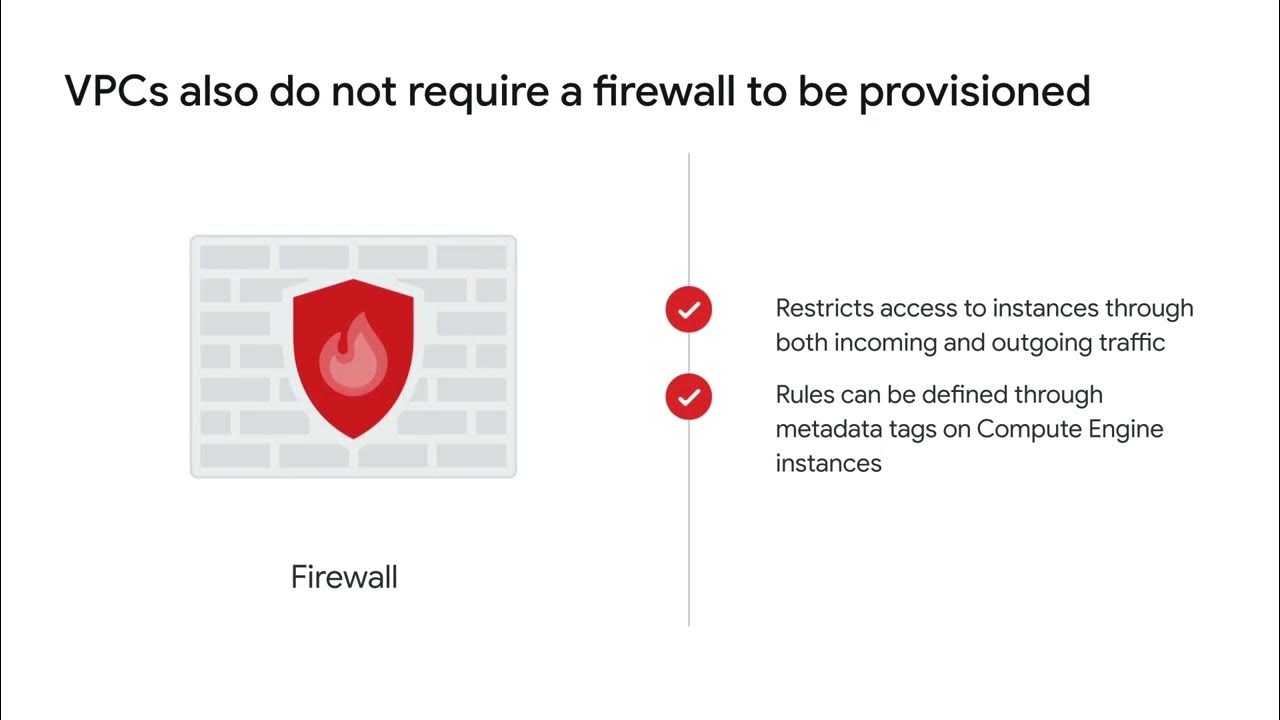What is a Firewall?
Summary
TLDRThe video script explains what a firewall is, highlighting its role as a security system that filters incoming internet traffic to prevent unauthorized access to a private network. It compares a network firewall to a building's firewall, emphasizing its function to contain potential threats. The script details how firewalls work with customizable rules, including examples of access control lists that allow or deny traffic based on IP addresses, ports, and other criteria. It also distinguishes between host-based and network-based firewalls, illustrating their applications and the importance of using both for maximum network security.
Takeaways
- 🔒 A firewall's primary function is to prevent unauthorized access to a private network by filtering incoming internet traffic.
- 🚫 It acts as a barrier, blocking unwanted traffic while allowing desired traffic to pass through, creating a safety zone between the private network and the public internet.
- ⚠️ The presence of hackers and malicious traffic on the internet necessitates the use of a firewall to protect private networks from potential harm.
- 🏢 Large organizations with numerous computers and servers are particularly reliant on firewalls to prevent disruptions and unauthorized access.
- 🔧 Firewalls are customizable through access control lists determined by network administrators, who decide what can enter and leave the network.
- 📋 Firewall rules can be based on IP addresses, domain names, protocols, programs, ports, and keywords, providing granular control over network traffic.
- 🌐 Network-based firewalls protect an entire network, operating at the network layer and applying management rules to prevent harmful activities.
- 💻 Host-based firewalls are software solutions installed on individual computers to provide localized protection.
- 🛡️ The use of both network-based and host-based firewalls provides layered security, ensuring that if one layer is breached, the other can still protect the network.
- 🏢 Organizations often employ a combination of firewall types for comprehensive network security, leveraging the strengths of each to safeguard their infrastructure.
- 🛠️ Firewalls come in various forms, including as built-in components of routers for smaller organizations or as standalone products for larger entities.
- 🌐 Modern high-tech environments, both at home and in businesses, rely on firewalls to maintain network integrity and security against external threats.
Q & A
What is the primary function of a firewall?
-A firewall's primary function is to prevent unauthorized access to a private network by filtering incoming information from the internet, thereby creating a safety barrier between the private network and the public internet.
Why are firewalls particularly important for large organizations?
-Firewalls are particularly important for large organizations because they have many computers and servers that they do not want to be accessible to everyone on the internet. This prevents hackers from disrupting the organization's operations.
How does a firewall compare to a firewall in a building structure?
-A firewall in a building structure provides a barrier to contain a fire and prevent it from spreading to other parts of the building. Similarly, a network firewall stops harmful activity from spreading into the network and causing harm.
What are the rules that a firewall uses to filter network data called?
-The rules that a firewall uses to filter network data are called an access control list, which can be customized by the network administrator to determine what can enter or leave the network.
Can you provide an example of how firewall rules might be applied based on IP addresses?
-In the script, an example firewall's access control list shows some IP addresses that are allowed to enter the network, while traffic from one specific IP address is denied based on the set rules.
What types of criteria can firewalls use to make rules?
-Firewalls can make rules based on IP addresses, domain names, protocols, programs, ports, and keywords to control access to the network.
How do port numbers play a role in firewall rules?
-Port numbers can be used in firewall rules to allow or deny incoming data. For example, the script mentions that data using port numbers 80, 25, and 110 is allowed, while data using port numbers 23 and 3389 is denied.
What is a host-based firewall and how does it differ from a network-based firewall?
-A host-based firewall is a software firewall installed on a computer to protect only that computer. In contrast, a network-based firewall is a combination of hardware and software that operates at the network layer and protects the entire network.
Why might an organization use both network-based and host-based firewalls?
-Organizations might use both types of firewalls to ensure maximum protection. A network-based firewall protects the entire network, while host-based firewalls provide individual protection for each computer and server, ensuring that any harmful data that gets past the network firewall can still be stopped.
Can you explain the role of a network-based firewall in the context of a router or a cloud infrastructure?
-A network-based firewall can be a standalone product used by large organizations, built into a router for smaller organizations, or deployed in a service provider's cloud infrastructure to manage rules applied to the entire network and stop harmful activity before it reaches the computers.
Outlines

This section is available to paid users only. Please upgrade to access this part.
Upgrade NowMindmap

This section is available to paid users only. Please upgrade to access this part.
Upgrade NowKeywords

This section is available to paid users only. Please upgrade to access this part.
Upgrade NowHighlights

This section is available to paid users only. Please upgrade to access this part.
Upgrade NowTranscripts

This section is available to paid users only. Please upgrade to access this part.
Upgrade NowBrowse More Related Video

Prüfungsvorbereitung Fachinformatiker Firewallregeln

Unit-VI Introduction to Windows and Linux Firewall

Routes and firewall rules in the cloud

Mengkonfigurasi Sistem Keamanan Jaringan - Teknik Komputer dan Jaringan

Securing your WiFi network

Firewall Penetration Testing: Steps, Methods, & Tools | PurpleSec
5.0 / 5 (0 votes)